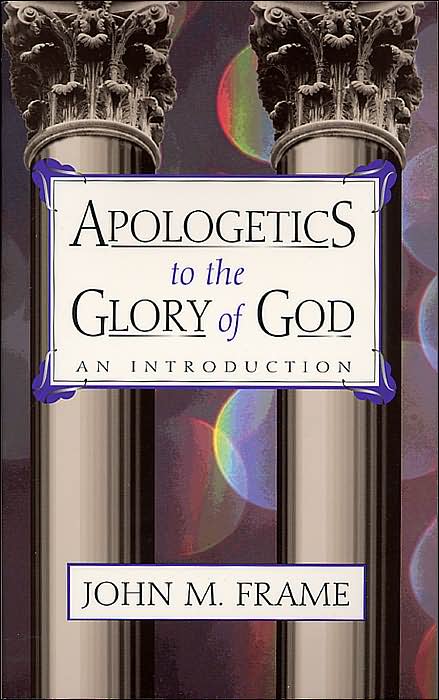|
Apologetics to the Glory of God by John M. Frame Reviewed by Tim Chaffey |
|
I had mixed feelings as I read this book which is subtitled: An Introduction. While it may serve as an introduction to Cornelius Van Til's apologetic approach, the book should not be viewed as an introduction to apologetics. It is semi-technical and therefore too deep (at times) for an introduction to the subject. (Note: Frame does not agree with Van Til on every point. It may be accurate to call him a “moderate” presuppositionalist.) I found myself saying "Amen!" at various times (now highlighted in my copy) and shaking my head in other places. Overall, I enjoyed the book but felt that it was lacking some important points. The book could be viewed as one side of the Calvinist apologetic approach. Frame endorses (with some qualifications) a Van Tillian approach (a.k.a. "presuppositional") while arguing against what he calls the Ligonier apologetic. Both sides presented in this book are decidedly Calvinistic[1] but nonetheless provide some important insights. In a chapter entitled "The Basics" Frame reminds the reader: "And don't be an apologist unless your first loyalty is to God - not to intellectual respectability, not to truth in the abstract, not to the unbeliever as such, not to some philosophic tradition." This is advice needs to be permanently etched in the mind of every apologist. Our commitment must be to God. Too many scholars and apologists have fallen into the "intellectual" trap in which they yearn for respectability among the secular intelligentsia. Frame later asks, "Are we so impressed by unbelieving 'wisdom' that we seek to gain the approval of unbelieving intellectuals based on their own criteria?" The apologist would do well to examine his or her motives on a regular basis since it is so easy to focus on our own "wisdom" rather than God's wisdom. The final chapter in the book is a mock dialogue between a pastor and an unbeliever on an airplane. This encounter is thoroughly enjoyable and serves as an excellent overview of Frame's apologetic approach. Throughout the book, the author explains the basic "proofs" for God's existence: the cosmological, moral (which he views as the strongest), ontological, and teleological. This may sound strange coming from a presuppositionalist, such as Frame; however, Frame argues in this book that a presuppositionalist does not discount "proofs" for God's existence. Does this mean that he is really a classical apologist instead? I don't think so. I believe a great deal of the debate surrounding these two apologetic systems is based on misunderstanding and misrepresentation of the opposing view. For more on this issue, see How Should We "Do" Apologetics? Perhaps the most frustrating part of the book is Frame's attempt to answer the "problem of evil" objection that is often raised. He spends two chapters on this one point. In the first of these two chapters, he attempts to critique various theodicies[2] that have been developed. This chapter is helpful in that it points out some of the difficulties in the various "solutions." In the next chapter, Frame puts forth his explanation which is really no explanation at all! Rather than answering the problem of evil, the author is forced (based on his Calvinistic presuppositions) to conclude that we cannot know why there is evil because God has not revealed the answer to us.[3] He rests in the fact that when we are in heaven there will not be a problem of evil. This is all well and good but it does not answer the question. I do not wish to get involved in a Arminian vs. Calvinist debate at this time. However, the problem for the Calvinist (as Frame describes one) on this issue is that he cannot claim that Adam chose to bring sin into the world (nor could he make this claim about Satan) because, from his point of view, we do not have a free will to make that choice. If that is true, then logically God is the author of evil because He not only "foreordained" it, but also because He "forced" Adam to sin. I believe there is a much easier answer to it. God gave Adam and Eve the ability to do right or to do wrong. They chose (freely - even though God knew they would) to violate His law and as a result sin, death, disease, and other effects of the curse were brought into this world. That is the simplistic answer to the problem of evil. For more on the subject see How Can a Loving God Allow Evil to Exist and Evil: Its Existence and Continuation. Besides this issue, I appreciated Frame's focus on the ability of God's Word to convict the sinner whether the unbeliever accepts it as divinely authoritative or not. According to the Bible, every person knows (on a certain level) about God and His law. This does not excuse the apologist from doing his homework so that he can reason with an individual to get them to the point of accepting God's Word. Both approaches can be and have been successful. This is a helpful book despite the above-mentioned frustration. [1] At this point, Midwest Apologetics does not deal with the Calvinist v. Arminian debate that is prevalent in so many places. [2] Theodicy literally means "justification of God" and refers to proposed solutions to the problem of evil. [3] This answer (if one can call it that) is also used by the fictitious pastor of the mock dialogue in the final chapter. |
|
Rating: (8 out of 10) About the Author (from back cover) John M. Frame (A.B., Princeton University; B.D., Westminster Theological Seminary; A.M. and M.Phil., Yale University) is professor of systematic theology and philosophy at Reformed Theological Seminary, Orlando campus. Among his pulbished works are Cornelius Van Til: An Analysis of His Thought and The Doctrine of the Knowledge of God. |
